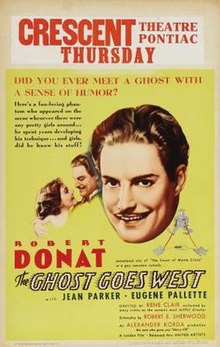The Ghost Goes West
| The Ghost Goes West | |
|---|---|
 | |
| Directed by | René Clair |
| Screenplay by | René Clair Geoffrey Kerr Robert E. Sherwood Lajos Biro[1] |
| Based on | Sir Tristram Goes West 1932 story by Eric Keown |
| Produced by | Alexander Korda |
| Starring | Robert Donat Jean Parker Eugene Pallette |
| Cinematography | Harold Rosson |
| Edited by | Henry Cornelius Harold Earle-Fishbacher |
| Music by | Mischa Spoliansky |
Production company | |
| Distributed by | United Artists |
Release date | 17 December 1935 (UK) |
Running time | 95 minutes |
| Country | United Kingdom |
| Language | English |
The Ghost Goes West is a 1935 British romantic comedy/fantasy film starring Robert Donat, Jean Parker, and Eugene Pallette, and directed by René Clair, his first English-language film. The film shows an Old World ghost dealing with American materialism.
Plot
Peggy Martin (Parker), the daughter of a rich American businessman (Eugene Pallette), persuades him to purchase a Scottish castle from Donald Glourie (Robert Donat), dismantle it and move it to Florida. Along with the castle goes its ghost.
Murdoch Glourie (also played by Donat) haunts the castle after dying a coward's death in the 18th century. To find rest, he must get a descendant of the enemy Clan MacClaggan to admit that one Glourie is worth fifty MacClaggans.
Main cast
- Robert Donat as Murdoch Glourie and Donald Glourie
- Jean Parker as Peggy Martin
- Eugene Pallette as Mr. Martin
- Elsa Lanchester as Miss Shepperton
- Ralph Bunker as Ed Bigelow, Martin's rival
- Patricia Hilliard as Shepherdess
- Everley Gregg as Mrs. Martin
- Victor Rietti as the Scientist
- Morton Selten as The Glourie
- Chili Bouchier as Cleopatra
- Mark Daly as Murdoch's Groom
- Herbert Lomas as Fergus
- Elliott Mason as Mrs. MacNiff
- Hay Petrie as The McLaggen
- Quentin McPhearson as Mackaye
Critical response
Writing for The Spectator in 1935, Graham Greene praised the film. He wrote of how the "camera sense" of René Clair (whose prior films were primarily satiric in nature) manifested itself in the film's "feeling of mobility, of visual freedom" and highlighted Clair's directorial genius. Greene also praised the acting of Pallette and Donat, describing Pallette's portrayal of an American millionaire as the finest performance of his career, and Donat's acting style as imbued with "invincible naturalness".[2]
The Ghost Goes West was the 13th most popular film at the British box office in 1935–36.[3] The film was voted the best British movie of 1936.[4]
Both the original treatment and the cutting continuity of the finished film were published in Successful Film Writing as Illustrated by 'the Ghost Goes West' by Seton Margrave. London: Methuen & Co. Ltd., 1936.
See also
References
- ^ The Ghost Goes West at Turner Classic Movies
- ^ Greene, Graham (27 December 1935). "The Ghost Goes West". The Spectator. (reprinted in: Taylor, John Russell, ed. (1980). The Pleasure Dome. pp. 40–41. ISBN 0192812866.)
- ^ The Film Business in the United States and Britain during the 1930s by John Sedgwick and Michael Pokorny, The Economic History Review New Series, Vol. 58, No. 1 (Feb., 2005), pp.97
- ^ "BEST FILM PERFORMANCE LAST YEAR". The Examiner (LATE NEWS EDITION and DAILY ed.). Launceston, Tasmania. 9 July 1937. p. 8. Retrieved 4 March 2013 – via National Library of Australia.
External links
- The Ghost Goes West at AllMovie
- The Ghost Goes West at the TCM Movie Database
- The Ghost Goes West at IMDb
- The Ghost Goes West at the AFI Catalog of Feature Films
- The Ghost Goes West on Screen Guild Theater: 21 August 1944
- Use dmy dates from July 2012
- 1935 films
- 1930s romantic comedy films
- 1930s historical comedy films
- 1930s fantasy-comedy films
- 1930s ghost films
- British films
- British romantic comedy films
- British fantasy comedy films
- British black-and-white films
- British ghost films
- Jacobite rising of 1745 films
- Films set in Scotland
- Films set in London
- Films set in New York City
- Films set in Florida
- Films set in the 18th century
- Films set in the 1740s
- Films set in the 1930s
- London Films films
- Films directed by René Clair
- Films produced by Alexander Korda
- British historical comedy films
- British historical romance films
- Historical fantasy films
- 1935 comedy films
